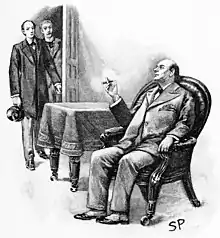Diogenes Club
The Diogenes Club is a fictional gentlemen's club created by Sir Arthur Conan Doyle and featured in several Sherlock Holmes stories, such as 1893's "The Adventure of the Greek Interpreter". It seems to have been named after Diogenes the Cynic (though this is never explained in the original stories) and was co-founded by Sherlock's indolent elder brother Mycroft Holmes.

The club as described by Sherlock Holmes in "The Adventure of the Greek Interpreter":
There are many men in London, you know, who, some from shyness, some from misanthropy, have no wish for the company of their fellows. Yet they are not averse to comfortable chairs and the latest periodicals. It is for the convenience of these that the Diogenes Club was started, and it now contains the most unsociable and unclubbable men in town. No member is permitted to take the least notice of any other one. Save in the Stranger's Room, no talking is, under any circumstances, allowed, and three offences, if brought to the notice of the committee, render the talker liable to expulsion. My brother was one of the founders, and I have myself found it a very soothing atmosphere.
Relation to British Secret Service
Although there is no hint in the original Sherlock Holmes canon that the Diogenes Club is anything but what it seems to be, several later writers developed and used the idea that the club was founded as a front for the British Secret Service. This may have its root in "The Adventure of the Bruce-Partington Plans" (1908), in which Mycroft Holmes is revealed to be the supreme and indispensable brain-trust behind the British government, who pieces together collective government secrets and offers advice on the best way to act.
The idea was popularised by The Private Life of Sherlock Holmes, a 1970 motion picture directed by Billy Wilder, and has since been frequently used in pastiches of Conan Doyle's stories as well as the TV series Sherlock.
In other media
The Diogenes Club has appeared, in various forms, in many other settings, most of which take as given the Club's connection to the British Secret Service:
- The Diogenes Club was featured in the Doctor Who 1994 Virgin New Adventures novel All-Consuming Fire, a Doctor Who/Sherlock Holmes crossover novel, which also refers to Kim Newman's character Charles Beauregard. A 2008 follow-up to this, in Big Finish's Bernice Summerfield series of audio adventures, is The Adventure of the Diogenes Damsel.
- Also in 2011, the club was mentioned in Guy Ritchie's movie Sherlock Holmes: A Game of Shadows, when Watson made a deduction about Mycroft prior to the stag party.
- The club also appears in Nicholas Meyer's 1974 novel The Seven-Per-Cent Solution, Alan Moore's The League of Extraordinary Gentlemen: Black Dossier graphic novel, the computer game Sherlock Holmes: Case of the Rose Tattoo, the Dark Horse Comics comic Predator: Nemesis, and in the short story "Closing Time" from Neil Gaiman's collection of short fiction Fragile Things. It is also featured in the Japanese manga Embalming -The Another Tale of Frankenstein-, where one of the club's founder's uses the alias "Mike Roft", a play on Mycroft, and remarks that "if you are looking for someone, my younger brother is quite good at that type of thing".
- Anno Dracula by Kim Newman features both the Diogenes Club and Mycroft Holmes. The Diogenes Club is again a headquarters of the secret decision-makers of the British government, with several members of board present—diminishing as the novel progresses—but Mycroft's words carrying the most authority. Its commitment to utter silence within its walls is portrayed as really being a high-security measure.
- In Philip José Farmer's Wold Newton Universe, specifically The Other Log of Phileas Fogg, it is stated that the real Diogenes Club was the Athenaeum Club, but that Arthur Conan Doyle changed the name for his stories.
- In the BBC TV series Sherlock episode "The Reichenbach Fall", the Diogenes Club is shown; Watson goes there, desperate to see Mycroft Holmes, gets into trouble for talking, and is briskly and not too gently escorted to the Stranger's Room by two muffle-shoed bouncers who hold a white gloved hand over his mouth to prevent his continued speaking. Furthermore, the club is also shown in the 2016 episode of Sherlock "The Abominable Bride" set in the Victorian Era. In this adaptation, the silent nature of the club stems from a desire to prevent the accidental leaking of state secrets by the members as, according to Mycroft, they all share one tea lady.
- In the CBS TV series Elementary, Mycroft is a restaurateur who owns a gourmet international restaurant chain called Diogenes.
- In the BBC TV series My Family episode "Sitting Targets", the final scene shows character Michael Harper receiving a trophy for outwitting his father at a Diogenes Club meeting.
- In the ABC TV series Forever, episode "Hitler on the Half Shell", Dr. Henry Morgan learns that The Morgan Trading Company has ties to the slave trade in the West Indies while meeting friends at the Diogenes Club in 1812.
- The club itself, as well as Sherlock's description of it nearly verbatim (but translated into Japanese) is featured in Volume 3, Chapter 11 of Nobuhiro Watsuki's manga Embalming.
- The Diogenes Club is also the name of a British alternative pop band.
- In 1932 a group of naturists founded The Diogenes Sun Club.[1]
References
- "Diogenes Sun Club". Diogenes Sun Club.